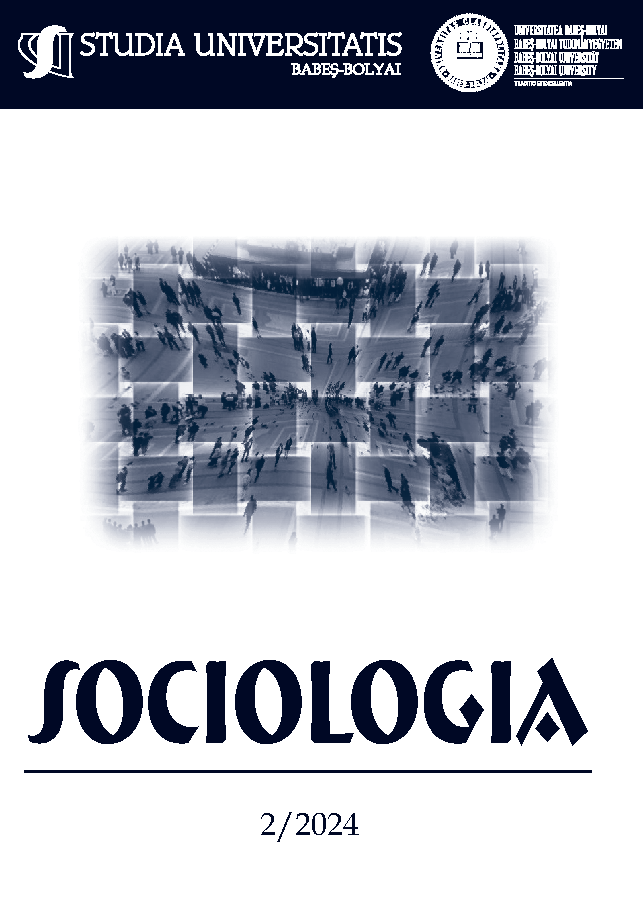REGULATION THEORY AND EUROPEAN INTEGRATION. REGIME(S) OF ACCUMULATION AND MODES OF REGULATION IN THE EUROPEAN UNION
DOI:
https://doi.org/10.2478/subbs-2024-0009Keywords:
regulation theory, regimes(s) of accumulation, mode of regulation, integrationAbstract
What can become visible once you turn the European integration in a political economy phenomena problem? Employing Regulation theory we aim to show an alternative heterodox version of understanding European integration and its shortcomings. Turning towards the European integration from the standpoint of Regulation Theory and its model of critical political economy, European integration cannot be separated from the production and reproduction of the prevailing capitalist regime of accumulation. Regulation theory operates with multi-scalar theoretical models coated in a mezzo-level abstractionist approach. Its analytical force it’s doubled by a disruption-oriented approach that offers a reformist critique to the capitalist order as it is reproduced within the confines of the EU. Consequently, the process of integration is structurally constrained by the (supra)national ‘institutional fix’ achieved by the dynamic historical and material configuration of the hegemonic mode of regulation. Assessing the limits and the contributions Regulation theory makes to the debate around the political economy of socio-political presuppositions and conflicts entailed by the integration process in the EU represents the main aim of this article.
References
1. Aglietta, M. (2000 [1979]). A Theory of Capitalist Regulation. The US Experience (London: Verso).
2. Apeldoorn van, Bastiaan, Transnational Capitalism and the Struggle over European Integration, London/New York, Routledge, 2002 – https://hdl.handle.net/1814/22656
3. Apeldoorn van, Bastiaan. (2013). The European Capitalist Class and the Crisis of its Hegemonic Project. In: Leo Panitch, Greg Albo (eds.), Socialist Register 2014 (pp. 189-206), Chapter: The European Capitalist Class and the Crisis of its Hegemonic Project. Publisher: Merlin Press.
4. Apeldoorn, B. v., & Horn, L. (2018). Critical Political Economy. KFG Working Paper Series, 87. Berlin: Freie.
5. Universität Berlin, FB Politik- und Sozialwissenschaften, Otto-Suhr-Institut für Politikwissenschaft Kolleg-Forschergruppe “The Transformative Power of Europe”.
6. Baccaro, L., & Pontusson, J. (2016). Rethinking Comparative Political Economy: The Growth Model Perspective. Politics & Society, 44(2), 175-207. https://doi.org/10.1177/0032329216638053
7. Baccaro, Lucio, Mark Blyth, Jonas Pontusson (eds.) (2022). Diminishing Returns: The New Politics of Growth and Stagnation. New York, NY: Oxford University Press.
8. Becker, J., Weissenbacher, R., & Jäger, J. (2021). Uneven development in the EU: Processes of core-periphery relations. In: Bigo, Didier, Diez, Thomas, Fanoulis, Evangelos, Rosamomd, Ben, Stivachtis, Yannis A. (eds.), The Routledge Handbook of Critical European Studies (pp. 224 - 238). Routledge. https://doi.org/10.4324/9780429491306-16
9. Andreas Bieler & Jamie Jordan & Adam David Morton, 2019. EU Aggregate Demand as a Way out of Crisis? Engaging the Post‐Keynesian Critique, Journal of Common Market Studies, Wiley Blackwell, vol. 57(4), 805-822.
10. Andreas Bieler and Jokubas Salyga, 2020. Baltic Labour in the Crucible of Capitalist Exploitation: Reassessing ‘Post-Communist’ Transformation. The Economic and Labour Relations Review. 31(2), 191-210.
11. Hans-Jürgen Bieling & Johannes Jäger & Magnus Ryner, 2016. Regulation Theory and the Political Economy of the European Union, Journal of Common Market Studies, Wiley Blackwell, vol. 54(1), 53-69.
12. Bohle, D. (2006). Neoliberal hegemony, transnational capital and the terms of the EU’s eastward expansion. Capital & Class, 30(1), 57-86. https://doi.org/10.1177/030981680608800104 (Original work published 2006)
13. Boyer, R., & Yamada, T. (eds.). (2000). Japanese Capitalism in Crisis: A Regulationist Interpretation (1st ed.). Routledge. https://doi.org/10.4324/9780203459171
14. Boyer, R., & Saillard, Y. (2002). Regulation Theory: The State of the Art (1st ed.). Routledge. https://doi.org/10.4324/9780203996775
15. Gill, S. (1998). New constitutionalism, democratisation and global political economy. Pacifica Review: Peace, Security & Global Change, 10(1), 23–38. https://doi.org/10.1080/14781159808412845
16. Habermas, Jürgen (2013). The Crisis of the European Union: A Response. Polity.
17. Kay, John (2003). The Truth About Markets. Progressive Politics. 2. https://doi.org/10.1007/0-387-26259-8_12.
18. A. Lyon-Caen et A. Jeammaud (1987). Droit du travail, démocratie et crise en Europe occidentale et en Amérique, 1986. In: Sociologie du travail, 29ᵉ année n°3, pp. 370-372.
19. Lowi, Theodore J. (1979). The End of Liberalism: The Second Republic of the United States. New York: W. W. Norton & Company.
20. Majone, G. (1994). The rise of the regulatory state in Europe. West European Politics, 17(3), 77–101. https://doi.org/10.1080/01402389408425031
21. Mandel, Ernest (1967), Internațional Capitalism and Supra-Nationality, The Socialist Register, vol. 4/March 18.
22. Nicoli, Francesco (2020). Neofunctionalism revisited: integration theory and varieties of outcomes in the Eurocrisis, Journal of European Integration, 42:7, 897-916, DOI:10.1080/07036337.2019.1670658
23. Philip Rathgeb, Arianna Tassinari (2022). How the Eurozone disempowers trade unions: the political economy of competitive internal devaluation, Socio-Economic Review, Volume 20, Issue 1, 323–350, https://doi.org/10.1093/ser/mwaa021
24. Ryner, M. (2012). Financial Crisis, Orthodoxy and Heterodoxy in the Production of Knowledge about the EU. Millennium, 40(3), 647-673. https://doi.org/10.1177/0305829812442300
25. Ryner, M., & Cafruny, A. W. (2016). The European Union and Global Capitalism: Origins, Development, Crisis. (The European Union Series). Palgrave Macmillan. https://www.macmillanihe.com/page/detail/The-European-Union-and-Global-Capitalism/?K=9781403997531
26. Stockhammer, Engelbert (2015). Rising inequality as a cause of the present crisis, Cambridge Journal of Economics, Volume 39, Issue 3, 935–958, https://doi.org/10.1093/cje/bet052
27. Talani, L. S., Cafruny, A., & Pozo-Martin, G. (2016). Handbook of Critical International Political Economy. Palgrave Macmillan.
28. Teague, P., & Grahl, J. (1989). European community labour market policy: Present scope and future direction. Journal of European Integration, 13(1), 55–73. https://doi.org/10.1080/07036338908428937
29. Wood, Ellen Meiksins (1981). The Separation of the Economic and The Political in Capitalism, New Left Review, I/127.
Downloads
Published
How to Cite
Issue
Section
License
Copyright (c) 2025 Studia Universitatis Babeș-Bolyai Sociologia

This work is licensed under a Creative Commons Attribution-NonCommercial-NoDerivatives 4.0 International License.



